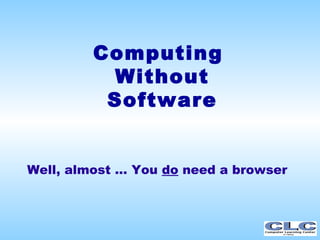Cloud Computing
•Download as PPT, PDF•
2 likes•682 views
A description of "Cloud Computing" along with some examples
Report
Share
Report
Share

Recommended
Recommended
More Related Content
What's hot
What's hot (18)
Cloud computing bible by barrie sosinsky elisa pacellis mymac com review

Cloud computing bible by barrie sosinsky elisa pacellis mymac com review
University of New Mexico Delivers Efficient ‘Common Good’ IT Services By Cent...

University of New Mexico Delivers Efficient ‘Common Good’ IT Services By Cent...
Similar to Cloud Computing
Similar to Cloud Computing (20)
cloud computing is the delivery of computing services

cloud computing is the delivery of computing services
Privacy Issues of Cloud Computing in the Federal Sector

Privacy Issues of Cloud Computing in the Federal Sector
Cloud Computing Presentation_Web Tools_Nicole Siegel

Cloud Computing Presentation_Web Tools_Nicole Siegel
Cloud Computing Presentation for Web Tools_Nicole Siegel

Cloud Computing Presentation for Web Tools_Nicole Siegel
Cloud Computing Presentation for Web Tools_ Nicole Siegel

Cloud Computing Presentation for Web Tools_ Nicole Siegel
More from Joel May
More from Joel May (20)
Recently uploaded
Recently uploaded (20)
ProductAnonymous-April2024-WinProductDiscovery-MelissaKlemke

ProductAnonymous-April2024-WinProductDiscovery-MelissaKlemke
Connector Corner: Accelerate revenue generation using UiPath API-centric busi...

Connector Corner: Accelerate revenue generation using UiPath API-centric busi...
Apidays New York 2024 - The value of a flexible API Management solution for O...

Apidays New York 2024 - The value of a flexible API Management solution for O...
Cloud Frontiers: A Deep Dive into Serverless Spatial Data and FME

Cloud Frontiers: A Deep Dive into Serverless Spatial Data and FME
How to Troubleshoot Apps for the Modern Connected Worker

How to Troubleshoot Apps for the Modern Connected Worker
Finding Java's Hidden Performance Traps @ DevoxxUK 2024

Finding Java's Hidden Performance Traps @ DevoxxUK 2024
Navigating the Deluge_ Dubai Floods and the Resilience of Dubai International...

Navigating the Deluge_ Dubai Floods and the Resilience of Dubai International...
Strategies for Landing an Oracle DBA Job as a Fresher

Strategies for Landing an Oracle DBA Job as a Fresher
ICT role in 21st century education and its challenges

ICT role in 21st century education and its challenges
CNIC Information System with Pakdata Cf In Pakistan

CNIC Information System with Pakdata Cf In Pakistan
Axa Assurance Maroc - Insurer Innovation Award 2024

Axa Assurance Maroc - Insurer Innovation Award 2024
Biography Of Angeliki Cooney | Senior Vice President Life Sciences | Albany, ...

Biography Of Angeliki Cooney | Senior Vice President Life Sciences | Albany, ...
Exploring the Future Potential of AI-Enabled Smartphone Processors

Exploring the Future Potential of AI-Enabled Smartphone Processors
Spring Boot vs Quarkus the ultimate battle - DevoxxUK

Spring Boot vs Quarkus the ultimate battle - DevoxxUK
Cloud Computing
- 1. Computing Without Software Well, almost ... You do need a browser
- 5. Cloud Computing - Definitions . . . the idea of relying on Web-based applications and storing data in the “cloud” of the Internet - MIT Technology Review
- 6. Cloud Computing - Definitions . . . a computing paradigm shift where computing is moved away from personal computers or an individual application server to a “cloud” of computers - Wikipedia
- 7. Cloud Computing - Definitions It starts with the premise that the data services and architecture should be on servers. We call it cloud computing – they should be in a cloud somewhere - Eric Schmidt CEO, Google
- 16. Cloud Computing Some Examples
- 33. Welcome to the Cloud ! This presentation is available for viewing at www.ewingsnet.com Click on “Presentations”
Editor's Notes
- Moving to the cloud means no more trying to remember whether you left the latest version of your life story on the desktop or the laptop. No more backing up everything to a thumb drive to move it from one device to another. No more copying all your stuff from one PC to another when you buy a new one. It also means you can create a repository of information that stays with you and keeps growing as long as you are alive.
